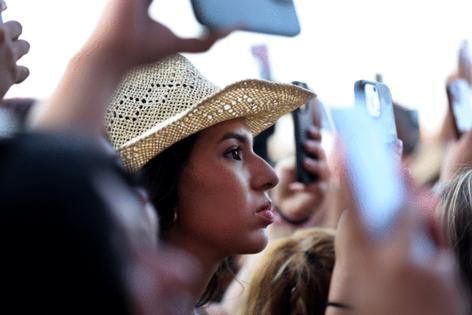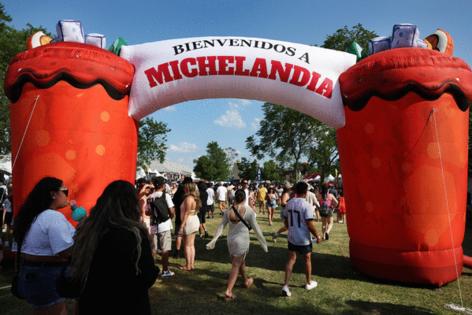Miche Fest's cancellation comes amid 'political climate' and issues with artist visas
Published in Entertainment News
CHICAGO — This summer was set to be Michelada Festival’s biggest year yet. With thousands of tickets already sold, Miche Fest, a Chicago street festival of Latino music gone mainstream, was canceled on Tuesday just weeks before its July dates at Oakwood Beach.
The two-day festival, which had its roots in Pilsen’s streets, moved first to Harrison Park and then last summer to Oakwood Beach, becoming one of Chicago’s largest Latino music festivals, bringing together thousands of people and featuring world-renowned artists who speak to different generations of Latinos. It had some 10,000 attendees daily in 2024.
While some have criticized the organizers for the sudden 2025 cancellation, co-founder Fernando Nieto said, many of their fans have been loyal to the festival for the last seven years. He said the cancellation felt like the right thing to do.
“Outside of the effect that it (the cancellation) might have on our business, we felt like it was a responsible thing to do for our fan base,” said Nieto on Wednesday. “We’ve built up an extremely loyal fan base since day one, and we felt, due to the uncertainty with what’s going on, it would be irresponsible to move forward without a clear path.”
The announcement on Tuesday said the reason was current concerns over visas and travel: “Because of the uncertainty around artist visas and the shifting political climate, we’ve made the difficult decision to cancel Michelada Fest 2025.”
Their Sunday lineup was more than 60% international artists who would need a visa to come to the United States and perform.
If they were unable to do so, there was no way, organizers said, they could replace their lineup with the level artists as the ones they had promised.
While Nieto said they cannot comment specifically on visa issues for specific artists, there were “enough to believe the issues over visas could escalate.”
“It’s too big of a risk for our business and for our fan base,” Nieto said. “Although it’s a tough one on a business side, we never want to put our fan base in the position where they’re not going to get the best possible experience.”
The first group to drop out of this year’s lineup was Los Alegres Del Barranco, a popular regional Mexican music group mostly singing corridos. In early April, the U.S. State Department revoked the band members’ visas for allegedly displaying a visual of a cartel kingpin during a recent show.
While Michelada Fest organizers quickly replaced the group with Gabito Ballesteros, a Mexican singer-songwriter considered one of the rising acts in the corridos tumbados, he, too, is now uncertain about having a visa to come to Chicago to perform for the festival, said Miguel Torres, Nieto’s business partner.
Corridos typically have lyrics that narrate a historical event, and have most recently focused on telling stories of drug lords or cartel activity in the current music scene.
A first-time Michelada Fest in El Paso, Texas, was held May 3, selling out a downtown venue with 8,000 attendees. Regional Mexican artists performed there for a single-day event. Nieto said that “it only all worked out because of luck and timing,” after all of the artists were able to get visas and perform.
El Paso headliner Neton Vega, a rising young Mexican singer known for his corridos and reggaeton, was also supposed to headline Sunday night in Chicago.
But a week after the El Paso music festival, organizers gathered to weigh the pros and the cons of hosting in Chicago, said Nieto
Hundreds have commented on the news.
“Thank you for thinking of your people and thinking ahead. It would be the most hurtful thing to see a beautiful festival like this targeted,” a user wrote.
“It’s sad to see this but it’s safe for our community. We have to fight for what’s right,” another one wrote.
Amid fears of President Donald Trump’s immigration crackdown, other events catering to and celebrating Mexican culture and Latinos have also been postponed and canceled in Chicago. The annual Cinco de Mayo parade in Pilsen was called off this year after nearly half of the parade sponsors dropped out, organizers said.
Earlier this year, a celebration of the Purepecha community, an indigenous group that immigrated to the Chicago area, was postponed due to the fear the community expressed over immigration enforcement agents in the area.
“The safety and peace of our community are our priority. We will remain vigilant about the situation and seek the best time to hold this celebration, so important to our identity and our roots,” the group posted on their social media.
For Nieto, beyond issues with artists’ visas performing at his Music Festival, the “writing was written on the wall.”
“The current administration is not only targeting our people, but our culture as well. In the meantime, we’ll continue to push on and regroup for Miche 2026,” wrote Nieto when he announced that for the first since its inception, Miche Fest would not take place.
For now, “stay tuned,” he said.
Many of their fans have asked for the return of Miche Fest back to the streets, with local talent and on a smaller scale. Like the old days.
“There’s a lot of nostalgia there,” Nieto added.
©2025 Chicago Tribune. Visit chicagotribune.com. Distributed by Tribune Content Agency, LLC.
















Comments